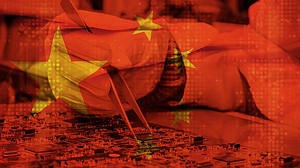10/30/2018

Analysis by Sherisse Pham, CNN Business
(CNN) -- The United States just delivered a sharp blow to China's lofty tech ambitions.
Its move to target a state-owned Chinese chipmaker over national security concerns goes to the heart of the clash between the two economic superpowers over technology and trade. It also exposes China's lack of successful homegrown semiconductor companies as one of the biggest vulnerabilities in the country's bid to become a global tech powerhouse.
The US Commerce Department on Monday announced that it is restricting American companies from selling crucial software and technology to Fujian Jinhua Integrated Circuit Co., saying it "poses a significant risk of becoming involved in activities that are contrary to the national security interests of the United States."
The ban could bring the chipmaker, which relies on foreign tech, to its knees. A similar US move against Chinese telecommunications equipment maker ZTE (ZTCOF) in April brought its factories to a standstill for months.
The US government didn't provide details about what potential activities it's worried about. But Fujian Jinhua, which is owned by the provincial government of Fujian in southeastern China, has been accused of stealing trade secrets by US chipmaker Micron Technology (MU).
Fujian Jinhua, which has filed a countersuit against Micron in China, didn't respond to a request for comment Tuesday.
The Trump administration has said China's efforts to get hold of American technology are "an existential threat" to the future of the US economy. It has made the issue a central part of its trade fight with Beijing, imposing tariffs on $250 billion of Chinese goods and threatening more unless Beijing changes its industrial policies.
The Chinese government sees the situation very differently, viewing the need to develop higher-tech manfucturing industries as vital to its economic development. Despite widespread complaints from companies, it denies it has sought to obtain US intellectual property by unfair means.
Trade war turmoil
Like the ZTE ban, the US move against Fujian Jinhua is likely to add to the tensions between Washington and Beijing.
"We hope the United States can do something that benefits both sides and something to improve mutual trust, not the opposite," Chinese Foreign Ministry spokesman Lu Kang said in response to a question about the new ban at a regular briefing Tuesday. He said further comment would come from the Commerce Ministry.
Analysts see little chance of either side backing down anytime soon. Trade talks between the two sides have failed to make headway this year. Bloomberg News alarmed investors Monday with a report that the US government is set to move ahead with even more tariffs if a meeting expected to take place next month between Chinese President Xi Jinping and US President Donald Trump doesn't go well. US stocks slumped, and the yuan fell to its lowest level in a decade in Asia trading.
Trump suggested Monday on Fox News that he's not expecting quick progress.
"I'd like to make a deal right now," he said. "I just say they're not ready."
China's reliance on foreign tech
President Xi Jinping has made building China's semiconductor industry a key priority, even comparing a computer chip to the human heart.
"No matter how big a person is, he or she can never be strong without a sound and strong heart," he said in April during a visit to a semiconductor factory in central China.
That heart is currently powered by foreign tech.
China buys more computer chips than any other country, consuming about $140 billion, or 38%, of the world's semiconductors, according to research firm IC Insights. Despite its voracious appetite, China produced just $18.5 billion, or about 13% of the world's chips.
Beijing is aggressively trying to close that gap, but developing a competitive chip industry is expensive, politically sensitive and takes time.
The government has invested billions in homegrown chipmakers like Fujian Jinhua, Tsinghua Unigroup and Innotron Memory to help them develop their own intellectual property. Even e-commerce company Alibaba (BABA) is getting in on the game, announcing last month that it will set up a company focused on building artificial intelligence chips for cloud computing, internet-connected devices and other sectors.
Chinese companies have also tried to get their hands on technology by bidding for foreign chip businesses. But several attempts to buy stakes in American firms failed after US authorities objected to the deals on national security grounds.
Despite the hurdles, China is impatient to grow the industry. Beijing's "Made in China 2025" plan — one of the industrial policies singled out by the Trump administration as a concern — includes the ambitious goal of achieving self-sufficiency in high-tech industries, including semiconductors, by 2025.
The trade war is complicating that effort.
China needs foreign tech to keep developing its homegrown chip industry, according to SEMI, an international association for companies that supply the electronics industry.
"We need to face up to the fact that there is still a certain gap between the domestic semiconductor industry and that of [the] international advanced level," the group's head of China, Lung Chu, told reporters in Shanghai last month. "Therefore, international cooperation is the key to industry growth."
